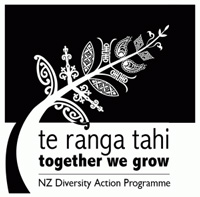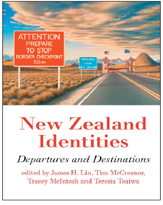|
Contact us Publisher info Parliamentary offices |
Govt
depts State owned enterprises Crown entities |
Legal
help sources Participation sources |
Prime information sources for handling local settlement issues
New Zealand Immigration Service
New Zealand Settlement Strategy, under implementation by the New Zealand Immigration Service, makes provision for links to community directories.
It also makes provision for national coordination and establishment of migrant resource services.
SETTLEMENT SUPPORT -
implementation
progress
Wellington City Council entered into a contract in mid 2005 with the Department
of Labour Workforce Group to be the lead agency for the Settlement Support
initiative in the Wellington area.
The Wellington Regional Settlement Strategy was seen by advisers to local councils “as an umbrella document that includes migrant attraction along with support for new migrants in the community”.
In Wellington, local management of the initiative will be through the City Council as the lead agency. It looked to appoint a Local Settlement Support Co-ordinator to be based in the Community Services Business Unit.
The Wellington City Council advertised for the Settlement Support Co-coordinator, funded by Department of Labour, in July 2005.
The Settlement Support Co-ordinator was described as being responsible for co-ordinating Community and government responses by assisting in local settlement planning. The co-ordinator was to be appointed for a fixed term of one year.
The advert wanted to hear from people who had:
• a good understanding of issues associated with the settlement
of migrants and refugees
• a knowledge of service provision for migrants and refugees in
the Wellington area
• key social leadership experience
• the ability to work as part of a team
• have proven competence in managing diverse and complex relationships
• excellent oral and written communication skills
• strong project management and report writing skills
• experience in developing relationships with stakeholders and community.
In this role the co-ordinator would:
• provide the required information, links and activities for the
local Settlement Support Initiative to function effectively
• support the development of positive relationships between the
Settlement Network Support Group, local organisations and the different
migrant communities
• improve the delivery of services from central government and community
agencies to the migrant and refugee communities
• foster collaboration between local and regional service delivery
agencies.
Applications closed Monday 8 August 2005. Information was provided by Nadia Fawzi, Intercultural Relationships Co-ordinator, Community Services, Wellington City Council. Their web is www.wellington.govt.nz/services/ethniccomm/index.html.
In April 2005 the Porirua City Council had considered the report of the Settlement services project and framework for the development of a Wellington regional settlement strategy.
The report sought endorsement of the most recent phase of developing and implementing a Wellington Region Settlement Strategy. A similar report was being presented to Wellington City, Hutt City, Upper Hutt City, and Kapiti Coast District Councils.
RECOMMENDATIONS FOR PORIRUA
In Porirua, it was recommended that the Council agree to endorse the settlement
services framework which was expected to result in the establishment of
a co-ordination function in the three areas of Wellington, Hutt Valley
and Porirua/Kapiti, including establishment of an advisory group and employment
of a migrant resource services co-ordinator in each area.
Council noted that these positions were expected to be fully funded through
an application for grant funding from New Zealand Immigration Service.
The process was to be overseen by the Officer Working Party established
to co-ordinate the Settlement Services Project, reporting to the CEOs’
Forum.
A further task was to be to incorporate issues identified, and further
actions in a reworked Wellington Regional Settlement Strategy to be completed
by the end of 2005.
A Draft Wellington Region Settlement Strategy had been developed in 2004-05
that “aspires to make Wellington a centre of excellence in settlement”.
This links strongly to central government initiatives to strengthen the
resourcing of migrant settlement.
The Wellington Mayoral Forum had taken a lead role on co-ordinating development of this programme.
A key consideration had been the role of central government (alongside local government) in improving the settlement process. In the June 2004 Budget, central government allocated funding for improved delivery of migrant resource services and a project has been developed to investigate how this could be implemented in Wellington region.
The Mayoral Forum recommended the establishment of a co-ordination function that would be delivered by three full-time co-ordinators of migrant services in the Wellington region.
The New Zealand Immigration Service had called for funding applications for this function (tailored to the circumstances in each area) with an expectation that nine such co-ordinators would be appointed across New Zealand in 2005 and a further 10 subsequently.
Excerpts from the background, wider implications and conclusions of the April 2005 report to Porirua City are recorded here.
BACKGROUND
The importance of new migrants with appropriate skills to the region’s
economic development, and the importance of good migrant outcomes to the
well-being of communities, is recognised in the development of a Wellington
Region Settlement Strategy. At an Immigration Forum for the region in
August 2003, it was agreed that a settlement strategy was needed to give
a stronger framework to this area, and the programmes of the various agencies
involved. The development of the strategy has been overseen by the Mayoral
Forum. The resulting draft Strategy aims to significantly lift the region’s
performance in first attracting, and then successfully settling migrants.
The Strategy is seen as an umbrella document that includes migrant attraction
along with support for new migrants in the community.
The Wellington Region Settlement Strategy is closely linked to national changes to immigration policy announced by the Government in July 2003 which affected the way migrants can obtain work permits and New Zealand residency. They gave effect to a change in policy direction of the Government from being a passive recipient of residence applications, to becoming an active recruiter of the skills and talent New Zealand needs. A new Skilled Migrant Category replaced the General Skills Category in late 2003/early 2004 and an enhanced points system now applies. Bonus points recognise qualifications and experience matching New Zealand’s skill shortages and relevant job offers in regions outside Auckland. This has been accompanied by significant new resourcing in the 2004 Budget.
The impact of these policy changes is not yet clear in terms of the percentage of migrants settling in Wellington. Good data on this is difficult to obtain because of internal movement (city to city within New Zealand) and subsequent emigration. The Census provides the most robust data on migration patterns, and the NZ Immigration Service is now recording better information to track migration trends.
WIDER IMPLICATIONS –
ENVIRONMENTAL AND/OR SOCIAL
A key consideration in settlement has been the role of central government
(alongside local government) in improving the settlement process. In the
June 2004 Budget, central government allocated funding for improved delivery
of migrant resource services and a project has been developed to investigate
how this could be implemented in Wellington region. The project examined
services currently being delivered to identify major issues and any gaps
in service delivery.
The report to the Mayoral Forum from that project highlights the complexity of this sector and the multitude of agencies involved. A clear theme emerged that better co-ordination of activities and work to ensure that new settlers were aware of services available, along with an ongoing mechanism to identify issues would be a significant improvement on the current situation. The report recommends the establishment of a co-ordination function that would be delivered by three full-time co-ordinators of migrant services in the Wellington region.
FINANCIAL IMPLICATIONS
This strategy is one of the six strategies outlined in an earlier report
to the Committee’s meeting on 23 March 2005. That report advised
that the sum package of initiatives would have financial implications
for Council. It was agreed, however, that the Chief Executive would explore
options for a co-ordinated approach with the appropriate government agencies,
and this approach will manage the New Settlement strategy. This work is
actively underway and there is a good chance of attracting further Government
monies to co-ordinate the range of contracts relevant to the wider employment
area.
Maintaining and developing a skilled workforce which includes new migrants is a key component of activities for all Councils in the Wellington region and this is likely to be reinforced by development of the Wellington Regional Strategy. New members of the community who settle successfully and call Wellington region “home” also have a positive impact on the strength and diversity of the community. These two factors have encouraged Councils to support migrant attraction and programmes that assist new migrants, and to be part of a regional effort to develop a Wellington Region Settlement Strategy.
AUCKLAND REGION
Manukau City facilitated the drafting of a regional settlement strategy for the Auckland region.
Updated by APEN, 15 August 2005
|
|||

